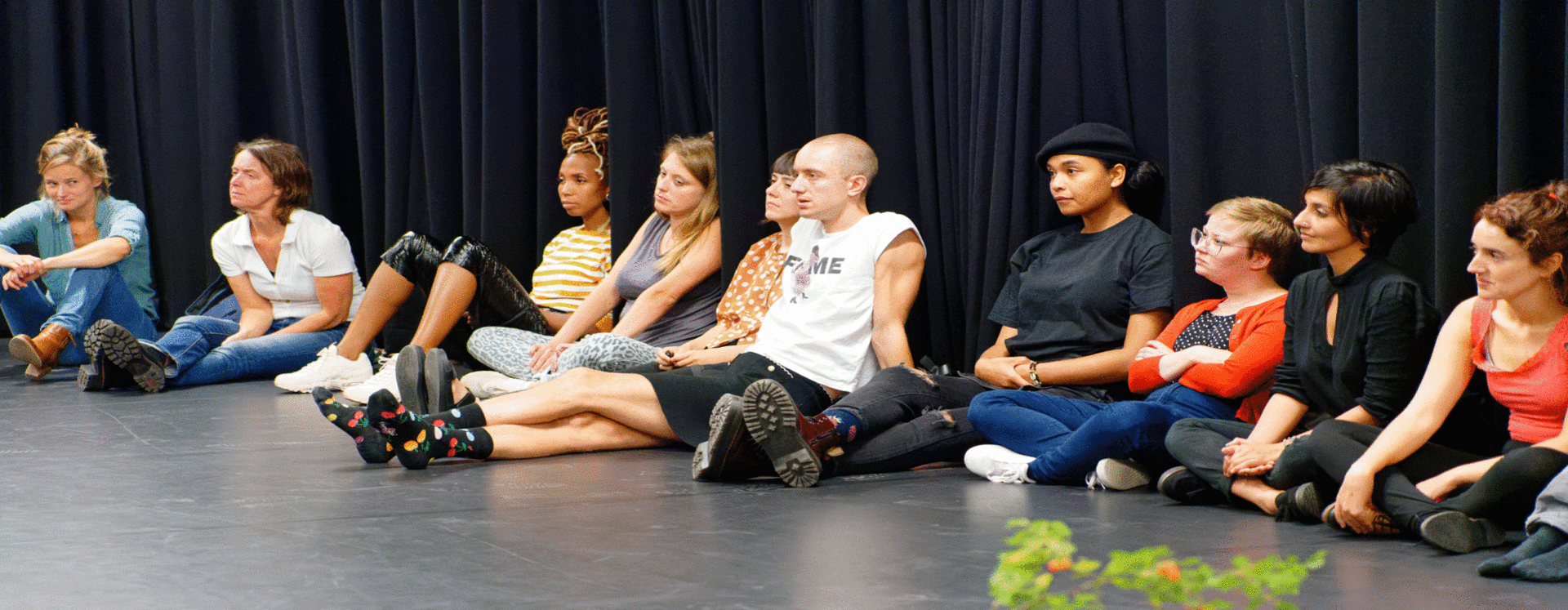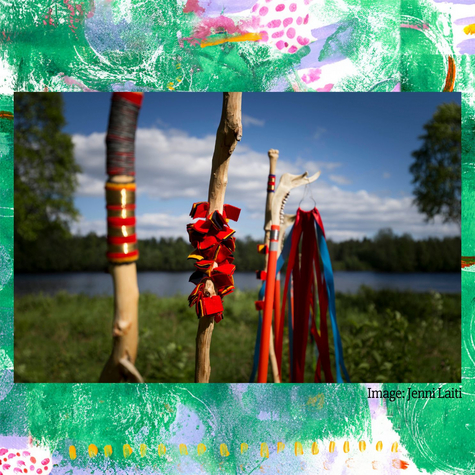Leanne Betasamosake Simpson in dialogue with guest indigenous artists Jenni Laiti, sata taas collective and Victor Bottenbley, moderated by Chihiro Geuzebroek
Leanne Betasamosake Simpson is a renowned Michi Saagiig Nishnaabeg writer, musician, academic and activist who has been widely recognized as one of the most compelling Indigenous voices of her generation. As part of her artist in residence program at the Academy of Theatre and Dance Amsterdam, Leanne invites us to join her in dialogue with the practices of Indigenous artists based in Europe: Jenni Laiti, sata taas collective and Victor Bottenbley. Moderated by Chihiro Geuzebroek, Leanne, Jenni, sata taas and Victor will offer short sharings of their artistic practices before opening out into a conversation with Leanne around the role of art in indigenous activism and survival.
Leanne Betasamosake Simpson is a renowned Michi Saagiig Nishnaabeg writer, musician, academic and activist who has been widely recognized as one of the most compelling Indigenous voices of her generation. Her work breaks open the intersections between politics, story and song—bringing audiences into a rich and layered world of sound, light, and sovereign creativity. She is a status member of Alderville First Nation in Ontario, Canada. Leanne is the author of eight previous books, including As We Have Always Done (2017) and Dancing on Our Turtle’s Back. Her novel Noopiming: The Cure for White Ladies, which was short-listed for the Dublin Literary Prize and the Governor General’s prize for fiction. Her latest project in collaboration with Robyn Maynard, Rehearsals for Living was short-listed for the Governor Generals prize for non-fiction and is a national best seller. Leanne’s album Theory of Ice was short- listed for the Polaris Prize and she was the recipient of the Prism Prize’s Willie Dunn award for innovation in video production. Working for two decades as an independent scholar using Nishnaabeg intellectual practices, Leanne has lectured and taught extensively at universities nationally and internationally and has twenty years experience with Indigenous land based education. She holds a PhD from the University of Manitoba.
Mihku Ilmára Jenni Unni Áile, Jenni Laiti (1981) is the daughter of Ilmár, who was a son to Mihkku, whose mother was Leinná, whose father was Sámmol, whose father was Gánddaš. Laiti belongs to the Mihkku family, who are craft masters in duodji, the traditional Saami handicrafts and is a link in the thousand-year chain of the craftswomanship of Sámi duodji and the Arctic Indigenous survival. Mun gulan Anárjohkii. They belong to their ancestral river, Anárjohka (Inarijoki), and are based in Jåhkåmåhkke (Jokkmokk), Sápmi. Laiti is a Sámi Artivist, a Duojár (Master of Traditional Sámi Crafts), an Indigenous Rights Activist and a Climate Justice Advocate. Love for their land and people, justice for all creation and radical ancestral futurity carry them in their path. Laiti mainly collaborates with others and acknowledges that humans are nothing without their communities. Laiti has been working with the local Sámi communities, ancestral and future generations on Sámi self-determination and local governance, advocating climate justice and crafting other worlds since they were 16 years old. They are devoted to the vision that their people would live as free people one day.
sata taas collective is a non-tangible network of narratives, memories, dreams, speculative fictions, affects, sensibilities and thoughts. it centers around the idea of revitalizing indigenous onthologies of relationality. unfolding in the form of temporal-spatial encounters of communal learning, healing, and worlding, sata taas seeks to nurture kinship, solidarity, and exchange among indigenous practitioners and their allies, beyond the politics of nation-state borders.
Chihiro Geuzebroek is Bolivian Dutch of Quechua ancestry activist and artist. In 2020 Chihiro co-founded the foundation Aralez dedicated to deepening and strengthening decolonial analysis, practice and coalition building. In 2021 and 2022 she worked with Mia Tengco on Indigenous Dreams expo (I and II) which was part of Indigenous Liberation program and shown in multiple venues.
Victor Bottenbley is aself-taught actor, director, autonomous artist, performer. Identifying as a member of the T’reweyu Kalina society of the Guyana region of Aryada (presently known as South America). Born 1961 in Paramaribo, capital of Surinam, raised in the Kalawashi Unde community, in the Marawini district. Entering the art landscape at 16 through dance. Has since accumulated experience in almost all sections of the performing arts, being dance, theatre, puppetry, television, cinema and music. As an artist aiming to forwarding universal Abyalala indigenous ethical values and philosophical principles from conviction they provide a path to a less destructive anthropocene.


